|
|
|
Sort Order |
|
|
|
Items / Page
|
|
|
|
|
|
|
| Srl | Item |
| 1 |
ID:
164981
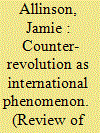

|
|
|
|
|
| Summary/Abstract |
This article argues that the case of the Egyptian 2011 revolution forces us to rethink accounts of counter-revolution in International Relations. The debate over whether the events of 2011–13 in Egypt should be considered a ‘revolution’ or merely a ‘revolt’ or ‘uprising’ reflects an understanding of revolutions as closed and discrete events, and therefore of international counter-revolution as significant only after revolutionary movements have seized sovereign power. Against this account, which maintains the idea of sovereignty as the boundary between domestic/social and international/ geopolitical phenomena, I argue that counter-revolutions can operate across boundaries during revolutionary situations before and to prevent revolutionary transformation and therefore affect whether a revolutionary sovereign power is established at all. Such counter-revolutions draw upon both the ideological inheritance of historical strategies of international ‘catch-up’, and the cross-border class relations that these different strategies bring into being. In the Egyptian case, the counter-revolution thus relied upon two factors deriving from this strategy: the ideological inheritance of Nasserism as a response to international hierarchy, and the integration of the post-Nasser Egyptian ruling elite with Gulf financial, and US security, networks.
|
|
|
|
|
|
|
|
|
|
|
|
|
|
|
|
| 2 |
ID:
051568
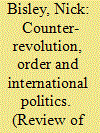

|
|
|
| 3 |
ID:
145627
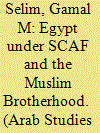

|
|
|
|
|
| Summary/Abstract |
This article seeks to examine the dynamics of counter-revolution in Egypt following the January 2011 revolution and their corresponding impact on the path of democratization in post-Mubarak Egypt. It argues that the popular calls for change that followed the Egyptian revolution have fallen repeatedly and quickly into the hands of a structural alliance of reactionary and constancy-oriented actors operating at the internal and external levels. These included the Egyptian Supreme Council of the Armed Forces (SCAF), the Muslim Brotherhood, and the United States with its intrusive global structure, all of which have emerged as agents of continuity and counter-revolution in post-Mubarak Egypt, in turn complicating any proposed genuine democratic transition.
|
|
|
|
|
|
|
|
|
|
|
|
|
|
|
|
| 4 |
ID:
173237
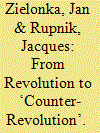

|
|
|
|
|
| Summary/Abstract |
The essay explains the origin, scope and forms of the anti-liberal surge taking place in Central and Eastern Europe. Why have voters across the region deserted the liberal politicians who managed to secure peace and prosperity on the ashes of communism? Does the erosion of democratic values and institutions lead to autocracy, or something novel? Special attention will be devoted to the issue of order and chaos in the broader European setting. Can order be maintained without shared values across EU member states? The conclusions will point to the variety of hybrid regimes in Central and Eastern Europe and assess their impact.
|
|
|
|
|
|
|
|
|
|
|
|
|
|
|
|
| 5 |
ID:
180010
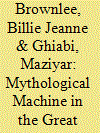

|
|
|
|
|
| Summary/Abstract |
The article revisits ‘sectarianism’ as an epistemic venue within the context of a Great Civil War in the Middle East (2001-2021), a label that includes the overarching narratives of political life in the aftermath of 9/11 up to the aftermath of the so-called ‘Arab Spring.’ By introducing the notion of the ‘mythological machine,’ it argues that ‘sectarianism’ is a myth, something that does not exist in real terms, but which has real world effects. The mythological machine is a device that produces epiphanies and myths; it is a gnoseological process, which has cultural, social and political effects through the generation of mythological facts and, as a machine, it does so through both guiding and automatized mechanisms. Through this interpretive shift, the article proceeds through several theoretical steps using a variety of cases from across West Asia and North Africa, contextualizing them within global political events. Firstly, the article argues that it is ‘civil war,’ shaped by the work of the mythological machine that governs state-society relations and transnational politics in the Middle East. Then, the article discusses how the mythological machine incorporates a semantic othering via mythological thinking, speak and practice that shapes the perception and experience of civil wars. To conclude, the article discusses how the mythological machine displaces people’s status in the context of civil wars leading to the emergence of new forms of belonging and nation-making. Ultimately, the mythological machine creates what Giorgio Agamben defines as a state without people, a condition exhausting the value of citizenship and the political.
|
|
|
|
|
|
|
|
|
|
|
|
|
|
|
|
| 6 |
ID:
149618
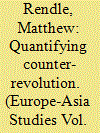

|
|
|
|
|
| Summary/Abstract |
This essay uses the numerous statistics produced by revolutionary tribunals to explore the nature of counter-revolution after the October Revolution, how it changed and developed across the Civil War, and the importance of revolutionary justice, as represented by tribunals, in facilitating the Bolsheviks’ victory. Statistics are unreliable sources and the state faced many problems in gathering data, but these figures permit us to explore key areas and trends, and demonstrate the ability of revolutionary justice to react in more nuanced ways to the counter-revolutionary threat than repressive organs such as the Cheka.
|
|
|
|
|
|
|
|
|
|
|
|
|
|
|
|
| 7 |
ID:
149447


|
|
|
|
|
| Summary/Abstract |
This article evaluates the aftermath of the Arab Spring through the dual optic of a regional phenomenon and a series of country narratives. These narratives are categorised by reference first to the secular states that found a path to stability after experiencing strong uprisings that drove rulers from power, second to the states in which the uprisings generated prolonged resistance and continuing acute instability, and third to the monarchies that neutralised the uprisings at their inception and restored stability. When other dimensions of conflict are taken into account, it seems likely that the Middle East will continue to experience chaos, intervention and counterrevolution for years to come, and possibly even a second cycle of uprisings directed at the evolving order.
|
|
|
|
|
|
|
|
|
|
|
|
|
|
|
|
|
|
|
|
|